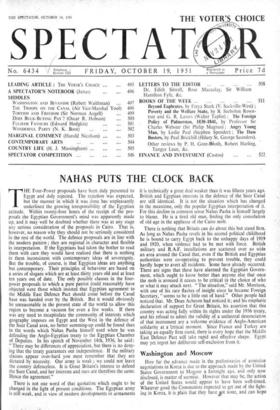NAHAS PUTS THE CLOCK BACK
THE Four-Power proposals have been duly presented to Egypt and duly rejected. The rejection was expected, but the manner in which it was done has unpleasantly underlined the growing irresponsibility of the Egyptian attitude. Within twenty-four hours of the receipt of the pro- posals the Egyptian Government's mind was apparently made up, and it may well be doubted whether there was at any stage any serious consideration of the proposals in Cairo. That is, however, no reason why they should not be seriously considered in the rest of the world. The defence proposals are in line with the modern pattern ; they are regional in character and flexible in interpretation. If the Egyptians had taken the bother to read them with care they would have realised that there is nothing in them inconsistent with contemporary ideas of sovereignty. But the trouble, of course, is that Egyptian ideas are anything but contemporary. Their principles of behavidur are based on a series of slogans which are at least thirty years old and at least ten years out of date. The only possible clauses in the four- power proposals to which a pure patriot Could reasonably have objected were those which insisted that Egyptian agreement to the Middle East Defence Pact should come before the Canal base was handed over by the British. But it would obviously be unreasonable in the present state of the world to allow this region to become a vacuum for even a few weeks. If there was -any need to recapitulate the community. of interests which geography imposes on Egypt and the West in the defence of the Suez Canal area, no better summing-up could be found than in the words which Nahas Pasha himself used when he was defending the Anglo-Egyptian treaty to the Egyptian Chamber of Deputies. In his speech of November 14th, 1936, he said: " There may be differences of appreciation, but there is no deny- ing that the treaty guarantees our independence. If the military clauses appear over-hard you must remember that they are dictated by necessity. Our army is weak ; we could not leave the country defenceless. It is Great Britain's interest to defend the Suez Canal, and her interests and ours are therefore the same. Hence the agreement."
There is not one word of that quotation which ought to be changed in the light of present conditions. The Egyptian army is still weak, and in view of modern developments in armaments it is technically a great deal weaker than it was fifteen years ago. British and Egyptian interests in the defence of the Suez Canal are still identical. It is not the situation which has changed in the meantime, only the popular Egyptian interpretation of it. For this decline in common sense Nahas Pasha is himself largely to blame. He is a tired old man, finding the only consolation of old age in the applause of the Cairo mob.
There is nothing that Britain can do about this but stand firm. As long as Nahas Pasha revels in his second political childhood he is bound to carry Egypt back to the unhappy days of 1919 and 1920, when violence had to be met with force. British military and R.A.F. installations are scattered over so wide an area around the Canal that, even if the British and Egyptian authorities were co-operating to prevent trouble, they could hardly hope to avert all incidents. Some have already occurred. There are signs that these have alarmed the Egyptian Govern- ment, which ought to know better than anyone else that once the mob is aroused it ceases to be critical in the choice of who or what it may attack next. " The situation," said Mr. Morrison. with one of his rare flashes of insight since he became Foreign Secretary, " seems to be a little out of hand." Other people had noticed that. Mr. Dean Acheson had noticed it; and his emphatic declaration of support for Great Britain, his assertion that this country was acting fully within its rights under the 1936 treaty, and his refusal to admit the validity of a unilateral denunciation of that instrument are a welcome evidence of Anglo-American solidarity at a 'critical moment. Since France and Turkey are taking an equally firm stand, there is every hope that the Middle East Defence Pact will take rapid and effective shape. Egypt may yet regret her deliberate self-exclusion from it.


































